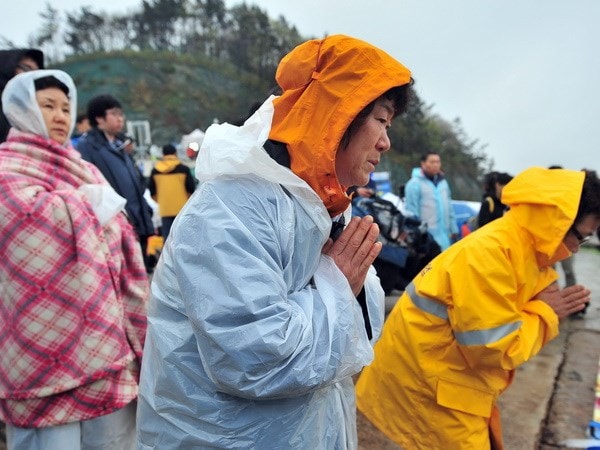The heartbreaking pain of parents in the SEWOL ferry sinking
The grief of any parent who has lost a child is hard to imagine. But it has been amplified in South Korea, due to the uncertainty over the fate of hundreds of people missing in the Sewol ferry disaster, many of them high school students on vacation, and the country’s culture of coping with such grief.
The grief of any parent who has lost a child is hard to imagine. But it has been amplified in South Korea, due to the uncertainty over the fate of hundreds of people missing in the Sewol ferry disaster, many of them high school students on vacation, and the country’s culture of coping with such grief.
For proof, one need look no further than hospitals, where many parents are being given intravenous fluids to stay healthy, having lost the ability to eat or drink due to grief.
 |
| Praying for luck for the missing passengers in the SEWOL ferry sinking. (Source: Kyodo/VNA) |
Some said they did not want to live. "If I did not have my child, I would rather jump into the sea," said one woman. "When I think of my child lying in the sea, how can I, as a mother, eat or drink? I hate myself for this."
In South Korea, suicide is a real threat. The country has the highest suicide rate among the 34 countries in the Organisation for Economic Co-operation and Development (OECD). Some point to its highly competitive society and a culture that is intolerant of failure as factors.
It is a culture where shame carries a huge burden and suicide is socially acceptable.
South Korean authorities have dispatched psychologists to help families with affected children, but they are completely unoccupied these days.
"No one comes to us for psychological counseling. The families don't care about their safety or health," said Han Kee Rae, a volunteer psychologist.
Counselors hope more people will come to them for help, especially given that South Korea has a high suicide rate.
There are fears that some will follow in the footsteps of Kang Min Kyu, vice principal of Danwon High School in Seoul's Ansan area. The 52-year-old was among the first to be rescued from the sinking ferry. But he hanged himself two days later.
Police say he committed suicide by tying his belt to a tree near the gymnasium in Jindo, where parents of many students were anxiously awaiting news.
In his suicide note, Kang said that the school trip was his idea and that the students' deaths were his fault. Suicide by a high-ranking official like him is unfortunately not uncommon in South Korea.
In 2009, former President Roh Moo Hyun also committed suicide, following a financial scandal. Hyundai Group Chairman Chung Mong Hun also jumped off a building to his death in 2003 while being investigated for corruption.
No one knows if there will be more suicides in the future, but one thing is clear and certain: families are still suffering and desperate while waiting for news of their children. This is clearly shown through the reaction of a mother who, after hearing the daily announcement from the authorities, shouted: "How are we going to live now?"/.
According to VNA






